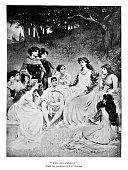"The Tale of the Pot of Basil"
Introduction
In John Keats’s The Tale of the Pot of Basil, a haunting narrative unfolds about forbidden love, greed, and undying devotion. Based on a tale from Boccaccio’s Decameron, Keats reimagines the story of Isabella and Lorenzo, two lovers torn apart by Isabella’s possessive and profit-driven brothers. This poem blends Gothic elements with romantic idealism, and at its heart is a meditation on female grief and resistance in the face of patriarchal oppression. Through rich imagery and emotional depth, Keats portrays Isabella as a tragic figure whose agency emerges most powerfully in her grief.
Summary
Isabella, a young woman from a wealthy family, falls in love with Lorenzo, a low-born clerk. Her brothers, seeing the affair as a threat to their social and economic ambitions, murder Lorenzo and secretly bury his body. Lorenzo appears to Isabella in a dream and reveals the location of his grave. She digs up his head and places it in a pot of basil, which she tends obsessively. Eventually, her brothers discover the pot and, realizing what she has done, steal it away. Isabella withers in despair and dies, her love unfulfilled and unavenged.
Analysis
Keats’s use of vivid, sensual imagery immerses the reader in Isabella’s emotional landscape. The pot of basil becomes a Gothic symbol of mourning and memory, nurturing life and decay at once. It is through her care for this plant that Isabella asserts control over her grief, transforming an act of horror into a ritual of devotion. The brothers’ coldness is contrasted with Isabella’s passion, making them embodiments of materialism and cruelty.
The theme of female agency is central to the tale. Although Isabella is victimized by her brothers, she reclaims a form of power through her love and mourning. In tending the basil pot, she resists the erasure of her beloved and maintains her connection to him. This act is both tragic and defiant, it allows her to preserve Lorenzo’s memory even as it consumes her.
The tale also critiques the commodification of human relationships. Isabella’s brothers see her primarily as a tool for forging alliances, not as an individual with desires. Their murder of Lorenzo reflects how patriarchal capitalism suppresses love that does not serve its ends. Isabella’s breakdown is a protest against this system, a mourning not only for her lover but for the autonomy stolen from her.
Personal Response
I found the story haunting and emotionally resonant. What stood out to me most was the intensity of Isabella’s devotion and the stark contrast between her emotional depth and her brothers’ heartlessness. The image of her weeping over the pot of basil lingered with me, it felt like a powerful metaphor for love’s endurance and tragedy. I appreciated Keats’s lyrical style and how he infused the tale with both tenderness and horror.
Conclusion
The Tale of the Pot of Basil remains relevant today as a critique of patriarchal control and the ways in which grief can become a form of resistance. Isabella’s obsessive love may be tragic, but it is also her most powerful assertion of self in a world that denies her autonomy. Keats’s adaptation transforms a medieval tale into a timeless meditation on love, loss, and the endurance of memory.
#"The_Decameron"
#"Boccaccio"
#"Medieval_Literature"
#"Literary_Review"
Introduction
In John Keats’s The Tale of the Pot of Basil, a haunting narrative unfolds about forbidden love, greed, and undying devotion. Based on a tale from Boccaccio’s Decameron, Keats reimagines the story of Isabella and Lorenzo, two lovers torn apart by Isabella’s possessive and profit-driven brothers. This poem blends Gothic elements with romantic idealism, and at its heart is a meditation on female grief and resistance in the face of patriarchal oppression. Through rich imagery and emotional depth, Keats portrays Isabella as a tragic figure whose agency emerges most powerfully in her grief.
Summary
Isabella, a young woman from a wealthy family, falls in love with Lorenzo, a low-born clerk. Her brothers, seeing the affair as a threat to their social and economic ambitions, murder Lorenzo and secretly bury his body. Lorenzo appears to Isabella in a dream and reveals the location of his grave. She digs up his head and places it in a pot of basil, which she tends obsessively. Eventually, her brothers discover the pot and, realizing what she has done, steal it away. Isabella withers in despair and dies, her love unfulfilled and unavenged.
Analysis
Keats’s use of vivid, sensual imagery immerses the reader in Isabella’s emotional landscape. The pot of basil becomes a Gothic symbol of mourning and memory, nurturing life and decay at once. It is through her care for this plant that Isabella asserts control over her grief, transforming an act of horror into a ritual of devotion. The brothers’ coldness is contrasted with Isabella’s passion, making them embodiments of materialism and cruelty.
The theme of female agency is central to the tale. Although Isabella is victimized by her brothers, she reclaims a form of power through her love and mourning. In tending the basil pot, she resists the erasure of her beloved and maintains her connection to him. This act is both tragic and defiant, it allows her to preserve Lorenzo’s memory even as it consumes her.
The tale also critiques the commodification of human relationships. Isabella’s brothers see her primarily as a tool for forging alliances, not as an individual with desires. Their murder of Lorenzo reflects how patriarchal capitalism suppresses love that does not serve its ends. Isabella’s breakdown is a protest against this system, a mourning not only for her lover but for the autonomy stolen from her.
Personal Response
I found the story haunting and emotionally resonant. What stood out to me most was the intensity of Isabella’s devotion and the stark contrast between her emotional depth and her brothers’ heartlessness. The image of her weeping over the pot of basil lingered with me, it felt like a powerful metaphor for love’s endurance and tragedy. I appreciated Keats’s lyrical style and how he infused the tale with both tenderness and horror.
Conclusion
The Tale of the Pot of Basil remains relevant today as a critique of patriarchal control and the ways in which grief can become a form of resistance. Isabella’s obsessive love may be tragic, but it is also her most powerful assertion of self in a world that denies her autonomy. Keats’s adaptation transforms a medieval tale into a timeless meditation on love, loss, and the endurance of memory.
#"The_Decameron"
#"Boccaccio"
#"Medieval_Literature"
#"Literary_Review"
"The Tale of the Pot of Basil"
Introduction
In John Keats’s The Tale of the Pot of Basil, a haunting narrative unfolds about forbidden love, greed, and undying devotion. Based on a tale from Boccaccio’s Decameron, Keats reimagines the story of Isabella and Lorenzo, two lovers torn apart by Isabella’s possessive and profit-driven brothers. This poem blends Gothic elements with romantic idealism, and at its heart is a meditation on female grief and resistance in the face of patriarchal oppression. Through rich imagery and emotional depth, Keats portrays Isabella as a tragic figure whose agency emerges most powerfully in her grief.
Summary
Isabella, a young woman from a wealthy family, falls in love with Lorenzo, a low-born clerk. Her brothers, seeing the affair as a threat to their social and economic ambitions, murder Lorenzo and secretly bury his body. Lorenzo appears to Isabella in a dream and reveals the location of his grave. She digs up his head and places it in a pot of basil, which she tends obsessively. Eventually, her brothers discover the pot and, realizing what she has done, steal it away. Isabella withers in despair and dies, her love unfulfilled and unavenged.
Analysis
Keats’s use of vivid, sensual imagery immerses the reader in Isabella’s emotional landscape. The pot of basil becomes a Gothic symbol of mourning and memory, nurturing life and decay at once. It is through her care for this plant that Isabella asserts control over her grief, transforming an act of horror into a ritual of devotion. The brothers’ coldness is contrasted with Isabella’s passion, making them embodiments of materialism and cruelty.
The theme of female agency is central to the tale. Although Isabella is victimized by her brothers, she reclaims a form of power through her love and mourning. In tending the basil pot, she resists the erasure of her beloved and maintains her connection to him. This act is both tragic and defiant, it allows her to preserve Lorenzo’s memory even as it consumes her.
The tale also critiques the commodification of human relationships. Isabella’s brothers see her primarily as a tool for forging alliances, not as an individual with desires. Their murder of Lorenzo reflects how patriarchal capitalism suppresses love that does not serve its ends. Isabella’s breakdown is a protest against this system, a mourning not only for her lover but for the autonomy stolen from her.
Personal Response
I found the story haunting and emotionally resonant. What stood out to me most was the intensity of Isabella’s devotion and the stark contrast between her emotional depth and her brothers’ heartlessness. The image of her weeping over the pot of basil lingered with me, it felt like a powerful metaphor for love’s endurance and tragedy. I appreciated Keats’s lyrical style and how he infused the tale with both tenderness and horror.
Conclusion
The Tale of the Pot of Basil remains relevant today as a critique of patriarchal control and the ways in which grief can become a form of resistance. Isabella’s obsessive love may be tragic, but it is also her most powerful assertion of self in a world that denies her autonomy. Keats’s adaptation transforms a medieval tale into a timeless meditation on love, loss, and the endurance of memory.
#"The_Decameron"
#"Boccaccio"
#"Medieval_Literature"
#"Literary_Review"
0 Commentarios
·2 Acciones
·218 Views
·0 Vista previa





